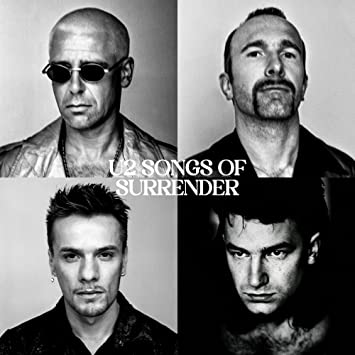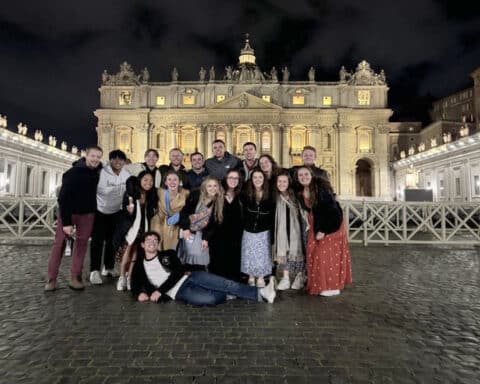On St. Patrick’s Day, the Irish band U2 released the album “Songs of Surrender,” consisting of stripped down, acoustic versions of 40 of their songs from across their 43-year recording history. Simultaneously, Disney+ released a companion documentary, “Bono and The Edge: A Kind of Homecoming, with David Letterman.” (Both these releases follow Bono’s highly regarded memoir, “Surrender,” from late 2022.) The documentary consists of a series of conversations with lead singer Bono (Paul David Hewson) and guitarist The Edge (David Howell Evans), interspersed with an insightful dialogue with musician Glen Hansard about U2’s music. Along the way, we are treated to performances of several songs at a small theater and local pub that was a hangout of the band in the early years.

At one point, Letterman says to Bono about his music: “You’re torn. Is it going to be this; is it going to be that? I think you even speculated that it was that tension that was useful to you creatively.” Over the beginning of a performance of “One,” Bono answers, “That’s exactly right. My life opened up as an artist when I realized you don’t have to resolve every contradiction. In fact, right at the center of contradiction is the place to be.” I think there’s something right about this, although I prefer the term “paradox” to contradiction. This might, in fact, be at the heart of U2’s ersatz reputation as a religious — and specifically a Christian — band. We Christians live in a kind of paradox: the work of Christ being finished, and yet we are on a pilgrimage toward the end.
Themes of pilgrimage occur in many U2 songs, as accounted for in the documentary. In “A Beautiful Day,” for example: “On the road, but you’ve got no destination. … Touch me / Take me to that other place / Teach me love / I know I’m not a hopeless case.” And, of course, two of their most successful songs explain that on “streets with no name” they “still haven’t found what [they’re] looking for.” About the former, Bono explains that he intended to point toward “a transcendent place we can go to together.” He wants his music to “mean something outside of just itself.”
This is illustrated in Bono’s discussion of the song “Sunday Bloody Sunday” about the Troubles in Northern Ireland. He changed some of the lyrics of the song for the new album. “Here at the murder scene / The beginning of a fiction / The facts will not come clean / Why so many mothers cry / Religion is the enemy of the Holy Spirit guide / Will the battle yet be done? / Where is the victory Jesus won?” And in the song “Bad,” sung the middle of the documentary and interspersed by discussions with Letterman about Irish national identity and unity, Bono sings the new lyrics, “You can only have it all if you give it all away.”
U2’s pilgrimage is part of the motivation for the reimagined versions of the songs on “Songs of Surrender.” Bono explains that “the greatest songwriting is never conclusive, but the search for conclusion.” This is a universal predicament and a perpetual longing. We seek some end that must be the answer to our deepest desires, and we are not content until we have found it.
I am sympathetic to Bono’s desire for his music to point to transcendence. And it’s certainly true that we are pilgrims on the way. But transcendent does not mean indeterminant. And if the streets have no name, we neither know where we are nor where we are going. Much as I like U2, their songs aren’t going to give names to the streets. I admire the journey, but the journey must have a goal. Like all forms of beauty, music can help us reach the goal, but it can’t provide it. Our hearts are restless, St. Augustine reminds us in his “Confessions,” until they find their rest in God.
Perhaps Bono and The Edge still haven’t found what they’re looking for. But I have a new appreciation for the humility of their search. The documentary closes with Bono and The Edge singing the closing chorus from “Invisible” with the small audiences at the theater and in the pub, “There is no them. There’s only us.” Together, “Songs of Surrender” and “A Kind of Homecoming” give me a better sense of the modesty of some of U2’s songs that have always seemed so grandiose. Perhaps the paradox is the thing.
Kenneth Craycraft is a columnist for Our Sunday Visitor and an associate professor of moral theology at Mount St. Mary’s Seminary and School of Theology in Cincinnati. Follow him on Twitter @krcraycraft.





